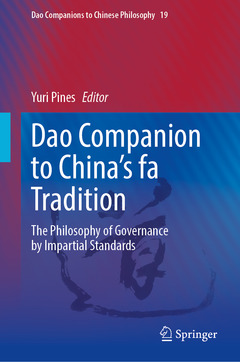Dao Companion to China’s fa Tradition, 1st ed. 2024 The Philosophy of Governance by Impartial Standards Dao Companions to Chinese Philosophy Series, Vol. 19
Coordonnateur : Pines Yuri

This volume offers the most comprehensive introduction to the ideas of ancient Chinese thinkers who looked to perfect a political system thru the emphasis on impersonal standards, laws, and norms (fa). This book covers the works of these thinkers, misleadingly dubbed Legalists, as well as the controversies they aroused, the legacy they left behind, and their potential relevance. The fa thinkers contributed decisively to the formation of China?s first unified empire in 221 BCE, but this contribution was not widely acknowledged. Their derision of the moralizing discourse of their rivals, dismissal of independent intellectuals as self-serving hypocrites, and advocacy of a powerful centralized state did not endear them to most Chinese literati. To a certain extent, these reservations remain visible in modern research, which explains why a comprehensive study of the fa traditions is still lacking. This volume fills that gap.
The first of four parts introduces major texts and thinkers of the fa tradition from the Warring States (453-221 BCE) to the Former Han (206/202 BCE-9 CE) periods. The second part analyzes the major ideas of the fa texts, including concepts of fa and their implementation in political and legal spheres, views of human nature, state-society relations, rulership, morality in politics, the evolutionary view of history, and philosophy of language. The third part focuses on the changing attitudes toward fa ideas in imperial and modern China. The fourth part explores the ideas of fa advocates from a comparative perspective?both against intellectual currents in early China and Western traditions such as Machiavellianism and totalitarianism. This book serves as a reference for students and researchers in ancient Chinese history and thought, and comparatists in the field of political philosophy.
0. The fa Tradition in Chinese Philosophy
Yuri Pines, Hebrew University of Jerusalem
Part I: Major texts and thinkers1. The Book of Lord Shang: The Ideology of the Total State
Yuri Pines, Hebrew University
2. Shen Buhai’s Theory of fa
Yu Zhong 喻中, China University of Political Science and Law
Translated: Avital Rom
3. Morality in the Shenzi 慎子 Fragments
Eirik Lang Harris, Colorado State University
4. Han Feizi: The World Driven by Self-Interest
Yuri Pines, Hebrew University
5. The Concept of fa in Guanzi and its Evolution
Sato Masayuki 佐藤將之, National Taiwan University
6. The Ideology of Chao Cuo
Christian Schwermann, Ruhr-Universität Bochum
Part II: Major Ideas of the fa Traditions7. Rule by Impersonal Standards in the Early Empire: Ideas and Realities
Maxim Korolkov, Heidelberg University
8. Fa and the Early Legal System
Ulrich Lau, Hamburg University, and Michael Lüdke, Friedrich-Alexander-Universität Erlangen-Nürnberg
9. Two Perspectives on the Fa Tradition: Politics versus the Rule of Impartial Standards
Song Hongbing, Renmin University of China
Translated: Ashton Ng
10. Human Motivation in the fa Tradition:
Visions from the Shenzi Fragments, Shangjunshu, and Han Feizi
Eirik Lang Harris, Colorado State University
11. The ruler in fa-based Government
Mark E. Lewis, Stanford University
12. The Historiography of Political Realism
Kai Vogelsang, Hamburg University
13. The Ruler’s New Tools: Fa 法 and the Political Paradigm of Measure in Early China
Romain Graziani, École Normale Supérieure de Lyon
14. Philosophy of Language in the fa Tradition
Lisa Indraccolo, Tallinn University
15. The fa Tradition and Morality
Alexus McLeod, Indiana University
Part III: Fa Traditions in history16. The Historical Reputation of the fa Tradition in Imperial China
Song Hongbing 宋洪兵, Renmin University
Translated: John Donegan-Cross
17. The fa Tradition and Its Modern Fate: The Case of the Book of Lord Shang
Yuri Pines, Hebrew University Part IV: Comparative Perspectives18. The fa Tradition versus Confucianism: Intellectuals, the State, and Meritocracy
Yuri Pines, Hebrew University
19. Fajia and the Mohists
Tao Jiang, Rutgers University
20. Laozi, Huang-Lao and the fa Tradition: Thinking through the Term xingming 刑名
Wang Pei 王沛, Eastern China University of Political Science and Law
Translated by Cao Yan; Revisions by Avital Rom
21. Machiavelli and the fa Tradition
Jason P. Blahuta, Lakehead University
22. The Book of Lord Shang and Totalitarianism’s Intellectual Precursors Compared
Alexandre Schiele, Hebrew University
Epilogue23. The Han Feizi and its Contemporary Relevance
Bai Tongdong, Fudan University
Yuri Pines 尤銳 is Professor of Chinese History at Hebrew University of Jerusalem. His research focuses on early Chinese political thought, Chinese political culture, early Chinese history and historiography, and comparative imperiology. His monographs include The Book of Lord Shang: Apologetics of State Power in Early China (2017); The Everlasting Empire: The Political Culture of Ancient China and Its Imperial Legacy (2012); and Envisioning Eternal Empire: Chinese Political Thought of the Warring States Era (2009). He co-edited six books on Chinese history and thought, and on comparative imperiology.
The most comprehensive study of fa traditions in any language
Presents the history of fa ideas and their continuous relevance
A look into an intellectual current that shaped much of China’s imperial history and remains relevant today
Date de parution : 04-2024
Ouvrage de 732 p.
15.5x23.5 cm



